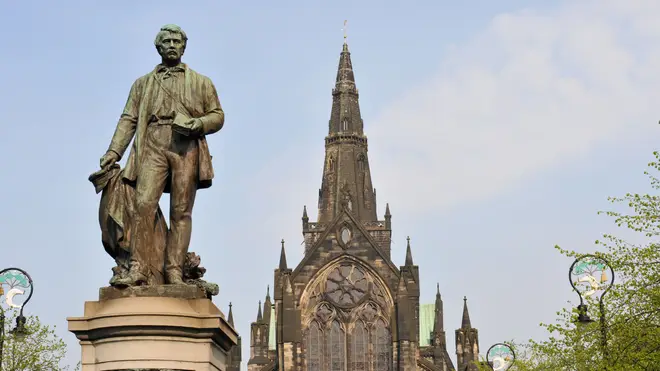
Iain Dale 10am - 1pm
30 March 2022, 08:26

Glasgow council have come under fire after a report revealed they are considering removing a statue of a famous abolitionist due to an alleged connection to the slave trade.
The statue of David Livingstone, the anti-slavery missionary and explorer, was highlighted in the council report as one of eight prominent statues in the city which could be removed.
David Livingstone is slated in the report for once working as a spinner in a mill using West Indian Cotton.
He was employed by Blantyre Mill from age 10, which was owned by Henry Monteith, who was in a partnership with two Glasgow-West India merchants.
The relatively high wages Livingstone from 1823 and especially after 1832 when he was promoted to a cotton-spinner which funded his education.
But Livingstone is historically know for publicising the horrors of the slave trade, condemning it as the "greatest meanness ever perpetrated".
The report does not call for the statue to be removed, but the findings will be discussed by the local authority, who will be holding public consultations.
Read more: Royals' 'dismay and regret' as Andrew takes prominent role with Queen at Philip memorial
Read more: Captured Ukraine 'hero' who said 'Russian warship go f*** yourself' is freed

Edward Colston statue replaced by sculpture of black protester
The report, which also features statues honouring James Watt and King William, has been branded a "hatchet job" by a UK heritage campaigner for targeting monuments of people who historically opposed to slavery.
Other figures named in the report include Colin Campbell, William Gladstone, John Moore, James Oswald and Robert Peel Junior. Buildings on the list include Pollok House, Aikenhead House, Haggs Castle, Linn House and Glasgow Academy.
Street names such as Buchanan Street and Glassford Street, both named after tobacco lords, also feature on the list.
The list also features Glasgow City Council's headquarters due to investment in a company which later trafficked slaves.
It was commissioned in the wake of the Black Lives Matter protests in June 2020 which saw the statue of slaver Edward Colston in Bristol torn down and dumped in Bristol Harbour.
Read more: Russia's promise to wind down assaults on Kyiv could be 'deception', US warns
Read more: Western sanctions have left no food on Russia's shelves, anti-Putin dissident reveals

Call Keir: Sir Keir says Colston statue should not have been torn down
The report said: "The paradox is that whilst historical research focused on Glasgow and slavery related themes is now relatively well known - and its political leadership and citizenry are in an informed position - the city lags behind in civic recognition."
Adding: "Whilst historians have addressed key aspects of Liverpool and Bristol’s history, notably in the Africa trafficking, there are multiple perspectives of Glasgow and its citizens’ connections with Atlantic slavery."